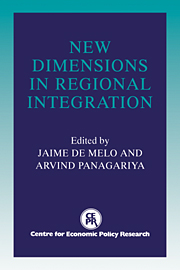Book contents
- Frontmatter
- Contents
- List of figures
- List of tables
- Preface
- Foreword
- Acknowledgements
- List of conference participants
- PART ONE SYSTEMIC ISSUES
- PART TWO COUNTRY ISSUES
- 6 The new regionalism: a country perspective
- Discussion
- 7 The European Community: a case of successful integration?
- Discussion
- 8 Regional integration in Sub-Saharan Africa: past experience and future prospects
- Discussion
- 9 Latin America's integration and the multilateral trading system
- Discussion
- 10 Regional integration in Eastern Europe: prospects for integration within the region and with the European Community
- Discussion
- 11 Regional trade arrangements in North America: CUSTA and NAFTA
- Discussion
- 12 Trading blocs and East Asia
- Discussion
- 13 Prospects for regional integration in the Middle East
- Discussion
- Round Table Discussion
- Index
Round Table Discussion
Published online by Cambridge University Press: 04 May 2010
- Frontmatter
- Contents
- List of figures
- List of tables
- Preface
- Foreword
- Acknowledgements
- List of conference participants
- PART ONE SYSTEMIC ISSUES
- PART TWO COUNTRY ISSUES
- 6 The new regionalism: a country perspective
- Discussion
- 7 The European Community: a case of successful integration?
- Discussion
- 8 Regional integration in Sub-Saharan Africa: past experience and future prospects
- Discussion
- 9 Latin America's integration and the multilateral trading system
- Discussion
- 10 Regional integration in Eastern Europe: prospects for integration within the region and with the European Community
- Discussion
- 11 Regional trade arrangements in North America: CUSTA and NAFTA
- Discussion
- 12 Trading blocs and East Asia
- Discussion
- 13 Prospects for regional integration in the Middle East
- Discussion
- Round Table Discussion
- Index
Summary
Larry Summers is said to have said that he favours all of the ‘laterals’ – unilateral, bilateral, plurilateral, multilateral. I associate myself with that position, provided it leads to more liberal trade.
Jacob Viner's celebrated distinction over forty years ago between trade creation and trade diversion has been mentioned several times in this volume. What has not been mentioned is the motivation that led Viner to that distinction – namely his puzzlement, in the age-old debate between free trade and protectionism, that both adversaries could agree on the desirability of customs unions (CUs) or free-trade areas (FTAs). How can that be? Two groups who seemed to disagree on everything concerning trade policy agreed on this point. Out of that conundrum came Viner's distinction between trade diversion and trade creation, and his conclusion that the two groups had different emphases in mind in favouring CUs. The point is that motivation and details are all important.
Thus the key question is not multilateralism versus regionalism, but what is the motivation underlying the particular proposal at hand, and what are the all-important details. There is plenty of room for regionalism in a framework that requires the right details. The multilateral framework that we have, which it seems to me is a reasonably good one, sets the ground rules under which bilateral or trilateral or regional arrangements can go forward consistently with the multilateral orientation of the general framework.
- Type
- Chapter
- Information
- New Dimensions in Regional Integration , pp. 453 - 463Publisher: Cambridge University PressPrint publication year: 1993
- 2
- Cited by



